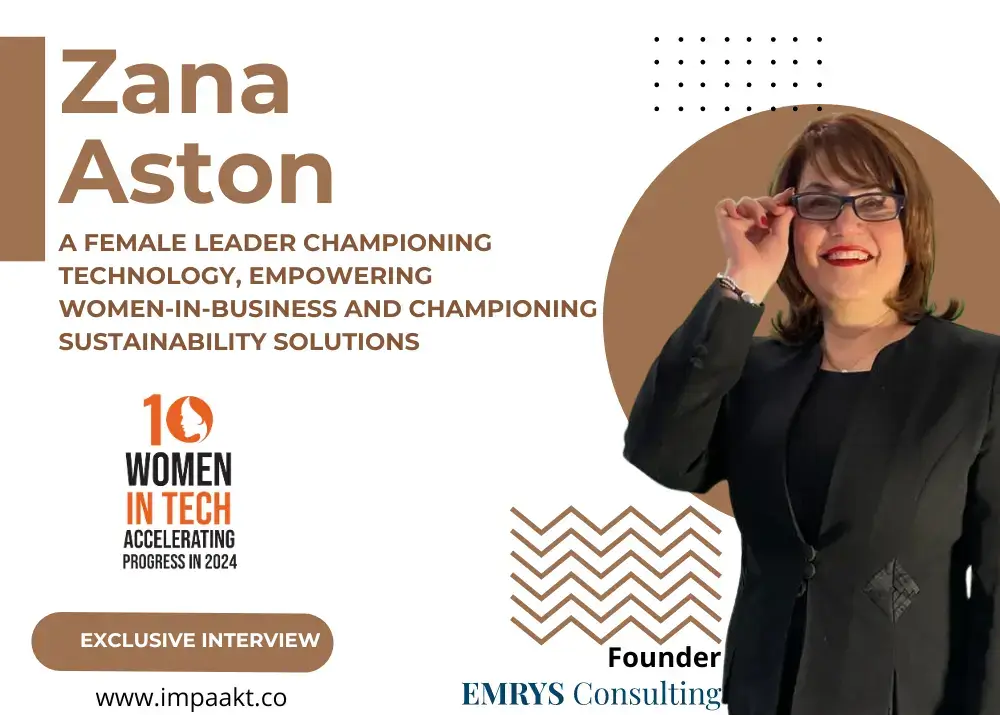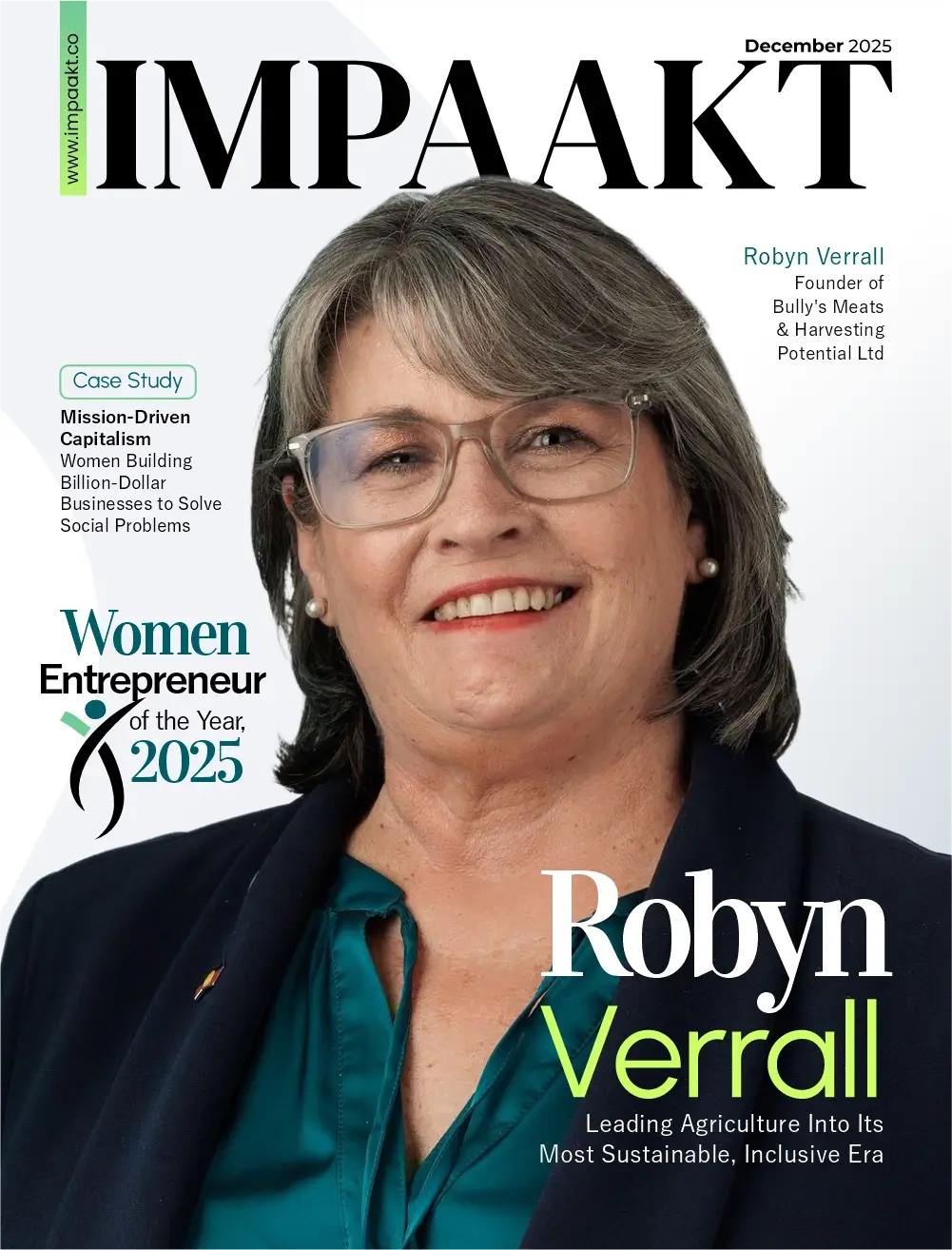Women-in-tech are solving the most pressing challenges of our time. Whether its finance, health or high-end technology solutions, women are at the forefront of innovation and leadership. But unfortunately, women representation is surprisingly light – not even a 25%!
In 2023, Mckinsey found Europe’s companies only employed 22% of women in tech roles. A similar pattern also seems apparent in the USA – with female representation of only 33%. These results do not simply belong to 2023 – rather a consistent derailment of women participation due to the ill norms of technology being the male dominated space.
Crushing all the norms is Zana Aston – Founder at EMRYS Consulting. She is an influential leader across many divisions of technology including HealthTech, FinTech, cybersecurity, and a champion of artificial intelligence.
At EMRYS Consulting, Zana has a clear focus on technology innovation that balances with Sustainability and ESG goals. Her scope covers energy-saving initiatives, Agritech in Vertical Farming, and hydroponics utilizing AI/IoT/Drone capabilities, alongside ML (Machine Learning) reporting – EMRYS Consulting has been exploring and contributing to all the solutions that pave the way to a sustainable future.
However, Zana moves beyond the title of a technology leader and has always rooted for women’s empowerment. Her journey of Women-in-tech (WIT) network to being a mentor and investor in Female startups, to running the tech consultancy, reflects her commitment to continuously exploring new horizons and contributing meaningfully to the tech industry.
Dive into her interview and learn more about Zana.
Zana, can you please share about your journey in the tech industry.
Embarking on a journey through the tech industry as a graduate Economist, my path has been shaped by a persistent drive towards running a business and fostering creativity. Initially, my career took a creative turn in the realm of Graphics and Desktop Publishing, where I had the privilege of working for my first Global Financial Client.
This experience laid the groundwork for my venture into the technological domain, leading me to various roles with Managed IT Service providers. My responsibilities spanned across Service Delivery and Customer Relations, enriching my understanding of the intricate dynamics between service providers and their clients.
As I delved deeper into the tech industry, my roles evolved to embody leadership positions such as the Head of DevOps, where I championed the Scrum/Agile methodologies, significantly improving team efficiency and product delivery. My journey did not stop there; I further expanded my expertise as a consultant around Data Management, Cloud Services, Product Development and Security; ultimately, embracing the cutting-edge fields of AI, IoT, Applications and Cloud technologies.
Two years ago, I achieved a significant milestone by completing a Global Tech Executive MBA, which not only broadened my perspective on the tech industry and circular economy, but also opened the door to launching my own business. This executive education equipped me with the strategic vision and further leadership skills necessary to navigate the complexities of the tech world, ESG goals as well as identifying emerging opportunities. Driven by a vision to empower and innovate, I founded Emrys Consulting, a female-led company dedicated to assisting late-stage startups and large enterprises in scaling their product development. At Emrys Consulting, we leverage our profound expertise in AI, IoT, Web, Mobile, and Cloud to facilitate rapid growth and innovation for our clients.
My journey includes the global WIT network, International Speaking Engagements, Mentoring and Investing in Female startups, to running the tech consultancy, reflects my commitment to continuously exploring new horizons and contributing meaningfully to the tech industry.
You have had extensive involvement in various events focusing on women in technology and leadership roles. How do you believe platforms like these contribute to advancing gender equality in traditionally male-dominated fields such as tech?
Platforms focusing on women in technology and leadership roles play a pivotal role in advancing gender equality within traditionally male-dominated fields such as tech. These platforms serve as crucial catalysts for change in several ways:
- Bringing Women Together: They create a supportive space where women can come together, fostering a sense of belonging and solidarity. This unity is essential in industries where women may otherwise feel isolated or underrepresented. By bringing women together, these platforms help to amplify their voices and ensure they are heard within the wider industry.
- Networking Opportunities: Such platforms provide invaluable networking opportunities, enabling women to connect with peers, mentors, and leaders within the tech industry. Networking can lead to collaborative opportunities, career advancements, and partnerships that might not have been accessible otherwise. These connections are vital for career development and for navigating the complexities of the tech industry.
- Sharing Experiences, Knowledge, and Ideas: They offer a space for sharing experiences, which is fundamental in learning from each other’s journeys, challenges, and successes. Knowledge exchange on these platforms can empower women with the tools, strategies, and confidence needed to overcome barriers and excel in their careers. Sharing ideas also fosters innovation and creativity, contributing to the growth and evolution of the tech industry.
- Fostering a Sense of Community: Impacts individuals’ professional and personal growth, making the tech industry more accessible and welcoming for women. Perhaps one of the most significant contributions of these platforms is the sense of community they cultivate. This community provides emotional support, encouragement, and a safe space for open dialogue about the challenges women face in tech.
By addressing the unique challenges women face in the tech industry, these platforms not only contribute to advancing gender equality but also enhance the diversity of thought, creativity, and innovation within the field. As a result, they not only support individual women in tech but also drive the industry forward as a whole.
With your extensive experience in digital transformation, AI and cybersecurity, how do you perceive the current landscape regarding opportunities for women in these areas? Are there any specific challenges that women still face, and if so, how can they be addressed?
The landscape of digital transformation, AI, and cybersecurity presents a burgeoning realm of opportunities as these fields continue to expand and evolve. With the increasing demand for expertise in these areas, the door is wide open for diverse talent to make significant contributions. However, despite the growth in opportunities, there remains a noticeable underrepresentation of women moving forward in these domains. This disparity not only exacerbates the issue of bias within code and algorithms but also impacts gender equality in the tech industry at large, including representation on corporate boards.
Addressing these challenges requires a multifaceted approach. Initiatives to encourage and support women from an early age in STEM fields are crucial, as is the need for mentorship programs that connect women with leaders in tech.
Additionally, companies must actively work to eliminate bias in their hiring and promotion processes and strive for greater transparency and inclusivity in their corporate cultures. By creating an environment that not only welcomes but champions women in tech, we can begin to close the gender gap and ensure that the digital future is built on a foundation of diversity and equality.
In your opinion, how can companies like those in your client portfolio, particularly in the finance and legal sectors, better promote gender diversity in their leadership and technology roles?
To better promote gender diversity in leadership and technology roles, companies, particularly those in my client portfolio within the finance and legal sectors, should focus on creating a culture that emphasises security, stability, and balance.
This includes offering an environment where growth opportunities are clear and accessible, and where flexibility regarding hours and locations is encouraged, catering to diverse life circumstances and promoting work-life balance.
Furthermore, the importance of independent leadership roles for women, ensuring equality in pay, and proactively addressing the glass ceiling are critical. Companies must actively promote a roadmap for women to ascend to C-level and board positions, demonstrating a genuine commitment to breaking down barriers and fostering an inclusive culture.
By implementing these strategies, companies can attract and retain talented women, thereby enriching their leadership and technology teams with diverse perspectives and skills, crucial for innovation and success in today’s competitive landscape.
Your background includes contributions to research on topics like FinTech in underdeveloped countries and AI in a circular economy. How do you see technology playing a role in empowering women economically, especially in regions with limited resources or opportunities?
Technology plays a crucial role in economically empowering women, particularly in regions with limited resources or opportunities. By connecting and empowering individuals, technology acts as a lever for change and advancement. Abundant information available through digital platforms provides women with the knowledge and resources necessary to start and grow their own businesses or pursue education and employment opportunities previously out of reach.
Digital banking opens up financial services to women who may not have access to traditional banking, enabling them to manage finances, receive payments, and access credit. Furthermore, advancements in Natural Language Processing (NLP) technologies allow women to become more visible and effectively communicate their ideas and products across global markets, breaking through country borders.
In contexts like FinTech in underdeveloped countries and AI in the circular economy, these technologies are not just tools but catalysts for inclusion, enabling women to participate more fully in the economy and society. By harnessing these technologies, we can create pathways for women’s economic empowerment, fostering greater equality and opportunity.
As an Angel Investor to small businesses, do you prioritize supporting women-led startups? If so, what criteria do you consider when selecting which ventures to invest in?
As an Angel Investor and a proud member of the Women-led Committee at the WBAF, where I serve as a mentor, juror, and panel speaker, supporting women-led startups holds a special place in my investment strategy.
My approach to selecting ventures to invest in goes beyond mere financial metrics; I delve into the essence of the founder herself. I strive to understand the power behind the woman leading the venture. Is she fearless in the face of challenges? Is she open to suggestions and constructive feedback? Does she embody the spirit of a team player?
Furthermore, I assess her values, vision, and mission, as these elements are crucial in determining the potential long-term success and impact of the startup. In a world where we have amazing role models ranging from inventors and business owners to space explorers, it’s essential to recognise and support the unique strengths and contributions of women in entrepreneurship.
My investment decisions are deeply influenced by the belief in empowering women leaders who demonstrate resilience, innovation, and a commitment to making a positive difference in their industries.
With your recent venture, September 2023, in Iceland focusing on women in innovation and sustainability, could you elaborate on why these topics are important to you personally and how they intersect with your work in technology?
Participating in my recent project in Iceland, centred on women’s roles in innovation and sustainability, was an incredibly rewarding and enlightening experience.
Serving as both a juror and a panel moderator allowed me the unique opportunity to connect with a diverse group of global innovators and thinkers in a nation celebrated for its dedication to sustainability and the promotion of gender equality.
This initiative struck a chord with me on a personal level, fuelling my eagerness to discover and engage with new advancements, particularly those led by women. The presented concepts demonstrated the profound understanding, commitment, and enthusiasm women contribute to the realms of technology and sustainability. These areas are vital as they highlight how technological advancements can tackle essential issues like climate change, promoting a more harmonious and stable environment for our planet.
Choosing Iceland as the venue for this event could not have been more fitting—an unspoiled, resource-rich, and environmentally conscious nation where the pursuit of sustainability and gender equality is embedded in the societal fabric. I take immense pride in knowing a colleague of mine is making strides in political leadership as a female presidential candidate there.
Iceland exemplifies forward-thinking and serves as an exemplary model for female leadership and ecological conservation. This event underscored the critical role of technology in fostering sustainable development and highlighted the necessity of championing women leaders who are pioneering these indispensable initiatives.
Adding to this, at Emrys Consulting, our technology aligns with ESG (Environmental, Social, and Governance) goals, and we are immensely proud of our projects and products that focus on sustainability. These include energy-saving initiatives, Agritech in Vertical Farming, and hydroponics utilizing AI/IoT/Drone capabilities, alongside ML (Machine Learning) reporting. These efforts underscore our commitment to leveraging cutting-edge technology in creating sustainable solutions that address critical global challenges.
Given your position as Chair of the WIT interest group, Women on Boards and Advisory Board Director of WIT® Croatia, what do you believe are the most pressing issues currently facing women in technology, and what steps can be taken to address them effectively?
In my capacity as Chair of the WIT interest group, Women on Boards, and as an Advisory Board Director of WIT® Croatia, I’ve identified several pressing issues that women in technology face today.
A critical challenge is the lack of funding and support for female founders in the tech sector. This financial hurdle is often compounded by obstacles in devising and implementing effective go-to-market strategies.
Moreover, the importance of mentoring, role models, and sponsors cannot be overstated; these are essential for opening doors to new opportunities and guiding women through the tech landscape.
Cultural barriers and glass ceilings further inhibit women’s progress in technology. To address these challenges effectively, it is imperative to spread awareness and provide training and information that pave the way for a more balanced working culture.
Such initiatives should highlight the obvious benefits to communities, businesses, and boards that come from embracing gender diversity.
By fostering an environment that actively supports female entrepreneurs through targeted funding, mentorship, and by challenging and changing the existing cultural norms, we can begin to dismantle the barriers that women in technology face, facilitating a more inclusive and equitable industry.
How do you view the role of women in driving sustainable innovation within the tech industry, particularly concerning areas like blockchain and AI?
The role of women in driving sustainable innovation within the tech industry, particularly in areas like blockchain and AI, is both transformative and essential. Women bring diverse perspectives, and approaches to the table, which are critical in fostering creativity and developing inclusive, equitable technologies.
Their involvement challenges the traditional norms and contributes to a more gender-balanced industry, leading to innovations that better serve a wider range of needs and populations. In blockchain, women are pioneering new applications for transparency, security, and equity, while in AI, they are at the forefront of ethical AI development, ensuring that AI technologies are designed and deployed responsibly.
By promoting diversity and inclusion, women are not just participants but crucial drivers of sustainable innovation, ensuring that technology advances in a way that benefits all of society.
As someone who mentors executives and is involved in corporate governance, what advice would you offer to young women aspiring to leadership roles in the technology sector, especially those facing barriers or discrimination based on gender?
As a mentor to executives and someone involved in corporate governance, my advice to young women aspiring to leadership roles in the technology sector, especially those facing gender-based barriers or discrimination, is to persist with resilience and confidence.
It’s important to cultivate a strong professional network that includes both allies and mentors who support your growth and advocate for your ideas.
Focus on building your expertise and demonstrating your capabilities, as competence speaks volumes.
Embrace opportunities for continuous learning and skill development to stay ahead in the rapidly evolving tech landscape.
Additionally, don’t shy away from voicing your opinions and asserting your worth; your unique perspectives are invaluable to innovation and progress.
Lastly, remember to support and uplift other women along your journey, fostering an environment of mutual growth and respect. Breaking through barriers requires courage and determination, but by doing so, you pave the way for a more inclusive and equitable industry.











